

Let's Play a Game - Learn Philosophy and Rhetoric via Digital Game-Ba… #Metagame Book Club (plus) How Teachers Can Use Video Games In The Humanities Classroom. Part 12 of MindShift’s Guide to Games and Learning.
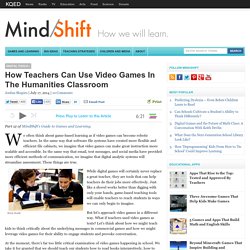
We often think about game-based learning as if video games can become robotic teachers. In the same way that software file systems have created more flexible and efficient file cabinets, we imagine that video games can make great instruction more scalable and accessible. In the same way that email, text messages, and social media have provided more efficient methods of communication, we imagine that digital analytic systems will streamline assessment.
These things are true. Erin Scott While digital games will certainly never replace a great teacher, they are tools that can help teachers do their jobs more effectively. But let’s approach video games in a different way. At the moment, there’s far too little critical examination of video games happening in school. On the contrary, video games may be indicative of a shift in the way we construct narrative. Play (activity) In psychology and ethology, play is a range of voluntary, intrinsically motivated activities normally associated with recreational pleasure and enjoyment.[1] Play is most commonly associated with children and their juvenile-level activities, but play can also be a useful adult activity, and occurs among other higher-functioning (non-human) animals as well.
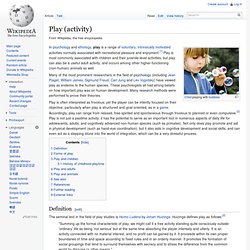
Many of the most prominent researchers in the field of psychology (including Jean Piaget, William James, Sigmund Freud, Carl Jung and Lev Vygotsky) have viewed play as endemic to the human species. These psychologists all had strong beliefs on how important play was on human development. Many research methods were performed to prove their theories. Play is often interpreted as frivolous; yet the player can be intently focused on their objective, particularly when play is structured and goal-oriented, as in a game. The seminal text in the field of play studies is Homo Ludens by Johan Huizinga. Children playing in a sandbox. Stuart Brown: Play is more than just fun. Jane McGonigal: Gaming can make a better world. Jane McGonigal: The game that can give you 10 extra years of life. Jane McGonigal: Massively multi-player… thumb-wrestling?
The Educational Games Database (TEGD) Social And Emotional Benefits Of Video Games: Metacognition and Relationships. Brad Flickinger Part 4 of MindShift’s Guide to Games and Learning.
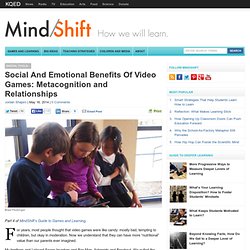
For years, most people thought that video games were like candy: mostly bad, tempting to children, but okay in moderation. Now we understand that they can have more “nutritional” value than our parents ever imagined. My brothers and I played Space Invaders and Pac Man, Asteroids and Breakout. We pulled the plastic casing off the Atari joystick and stuck the accordioned bottom end to our foreheads like a suction cup. Kids played video games for hours. Along came Oregon Trail, Reader Rabbit, Math Blaster, and others. Clearly, the world has changed considerably since then. In 2013, the American Psychological Association published a study that identified some of the benefits of gaming, and the results were surprising.
Of course, neural advantages like these are vague and invisible. We want our children to develop strong meta-cognitive skills. Newsmaker: James Gee on Why the Power of Games to Teach Remains Unrealized. Gee: “We need to begin to get teams of people — game designers, content people, assessment people, learning people — who can get on the same page.”
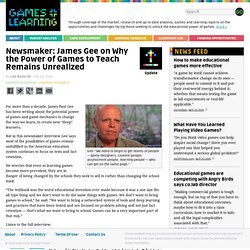
For more than a decade, James Paul Gee has been writing about the potential power of games and game mechanics to change the way we learn, to create new “deep” learners. But in this newsmaker interview Gee says most of the possibilities of games remain unfulfilled as the American education system continues to focus on tests and fact retention. He worries that even as learning games become more prevalent, they are in danger of being changed by the schools they seek to sell to rather than changing the school itself.
“The textbook was the worst educational invention ever made because it was a one size fits all type thing and we don’t want to do the same things with games. We don’t want to bring games to school,” he said. Listen to the full interview: The following is an edited version of the full conversation: Has much changed in the last decade? Financial Entertainment. Can Vampires Make You a Better Investor? Dr. James Paul Gee, Opening Keynote on the New Livestream. EDUCAUSE Games & Learning Constituent Group Hangout #1. Edward Castronova. Don't Play Games With Me! Promises and Pitfalls of Gameful Design.
Sebastian Deterding – Closing keynote: Don’t play games with me with me. Web Directions @media 2011, London, May 27th 1:40pm.
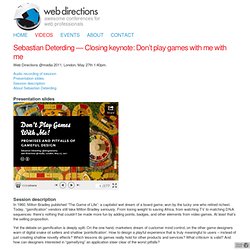
Presentation slides Session description In 1960, Milton Bradley published “The Game of Life”: a capitalist wet dream of a board game, won by the lucky one who retired richest. Today, “gamification” vendors still take Milton Bradley seriously. From losing weight to saving Africa, from watching TV to matching DNA sequences: there’s nothing that couldn’t be made more fun by adding points, badges, and other elements from video games. Yet the debate on gamification is deeply split. About Sebastian Deterding Sebastian Deterding is a designer and researcher usually flown in for some thorough German grumpiness. Paideia as Paidia. Friday Keynote: Breakfast & Keynote: Paidia as Paideia: From Game-Based Learning to a Life Well-Played.
Gabe Zichermann: How games make kids smarter.
Badges. John Seely Brown on Motivating Learners (Big Thinkers Series) Daphne Bavelier: Your brain on video games. How World of Warcraft Could Save Your Business and The Economy. James Paul Gee on Learning with Video Games. Aran Levasseur - Peacemaker: Video Games and Learning.